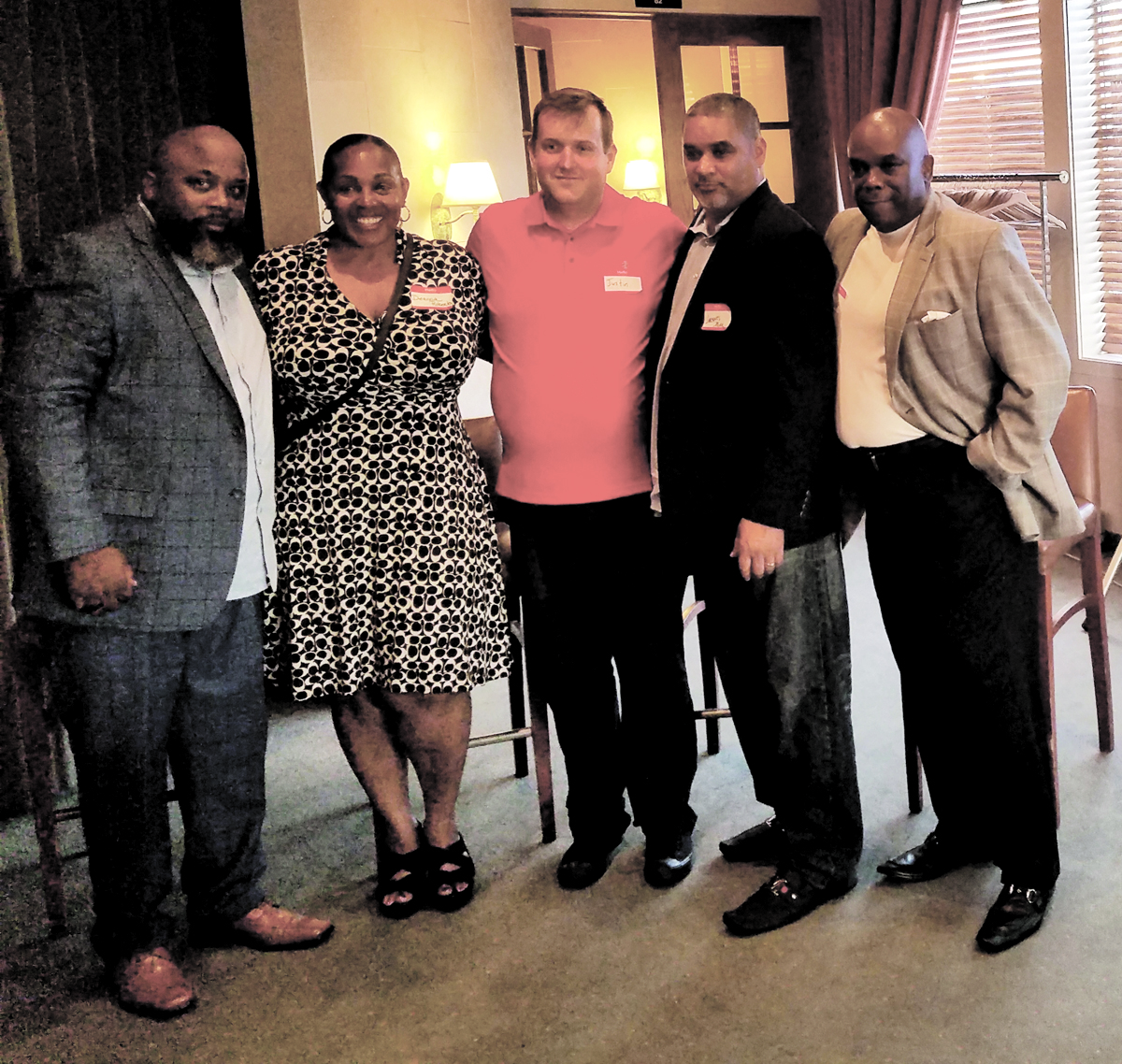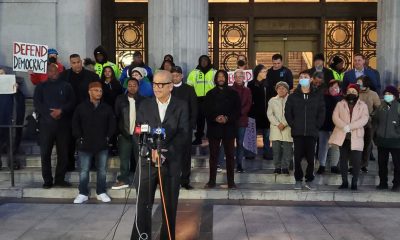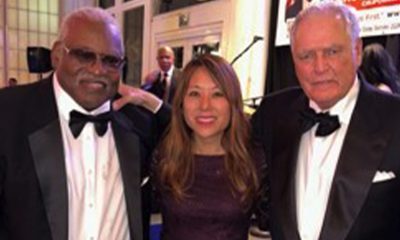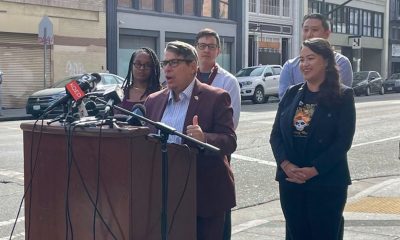Business
Black Entrepreneurs Share Experience, Advice at Jack London Square Summit

Goal-setting has always been a part of Dwayne V. Davis’ life.
The businessman and youth mentor is launching a new company that he says will help people reach their highest potential. Using the theme “See it. Believe it. Achieve it,” Life’s Unlimited Possibilities pledges to show people how to live a limitless life.
“By identifying where you are and where you want to go, my company can assist any individual with a dream,” said Davis. “With the right coaching and guidance, anything is possible. Businesses can thrive in this economy. There is so much territory to be claimed.”
Davis recently hosted a panel discussion at Scott’s Restaurant in Oakland’s Jack London Square featuring expertise, resources and insights with four panelists representing event planning, branding, marketing and coaching.
Deanna Roberts of DR Roberts Events Management shared how her first projects were weddings and eventually expanded to First Fridays networking and social gatherings.
After working for the Warriors and Raiders, she now has multiple Fortune 500 commercial clients and international projects. “When you have a reputation for taking great care of your clients, your business can expand even through word of mouth,” said Roberts. “Also, stay in tune with your industry trends and changes.”
Marketing Kings owner Tyranny Allen spoke of touring with Digital Underground for two years. The writer-producer said he made $60,000 at the time but came home with $2,000. “That was a real game-changer and I began to build my own businesses,” said Allen. With a branding agency, four barbershops, a boutique and several ventures on the horizon, Allen is now an Oakland-based serial entrepreneur.
“You have to be willing to brand yourself, be committed, open doors for the next generation, and leave your legacy,” he said.
For Jacques Pryor of KBLX, working hard has always been his focus. From the days of KBLX Brunch to owning the Kimball’s East night club, Pryor was known as booking more artists in Bay Area venues than anyone else at the time. Many never knew that Pryor was the very first African American to promote concerts at the Oakland Coliseum. Pryor is currently using his business savvy to invest in technology.
“You have to always work hard, stay focused and always know your ROI (return on investment).”
Guest speaker Justin Pitts became a millionaire at 23 making $6.5 million and lost it three months later. The business coach and author of “The Summit,” says his success now at 32 gives him an edge in life.
“You learn and grow from your mistakes, but don’t let that stop you,” he said. Through Justin Pitts Training and Consulting, Pitts now has 5,000 consulting clients and 67 trainers. “It’s not how you begin, but how you finish,” said Pitts.
Activism
OP-ED: AB 1349 Puts Corporate Power Over Community
Since Ticketmaster and Live Nation merged in 2010, ticket prices have jumped more than 150 percent. Activities that once fit a family’s budget now take significant disposable income that most working families simply don’t have. The problem is compounded by a system that has tilted access toward the wealthy and white-collar workers. If you have a fancy credit card, you get “presale access,” and if you work in an office instead of a warehouse, you might be able to wait in an online queue to buy a ticket. Access now means privilege.

By Bishop Joseph Simmons, Senior Pastor, Greater St. Paul Baptist Church, Oakland
As a pastor, I believe in the power that a sense of community can have on improving people’s lives. Live events are one of the few places where people from different backgrounds and ages can share the same space and experience – where construction workers sit next to lawyers at a concert, and teenagers enjoy a basketball game with their grandparents. Yet, over the past decade, I’ve witnessed these experiences – the concerts, games, and cultural events where we gather – become increasingly unaffordable, and it is a shame.
These moments of connection matter as they form part of the fabric that holds communities together. But that fabric is fraying because of Ticketmaster/Live Nation’s unchecked control over access to live events. Unfortunately, AB 1349 would only further entrench their corporate power over our spaces.
Since Ticketmaster and Live Nation merged in 2010, ticket prices have jumped more than 150 percent. Activities that once fit a family’s budget now take significant disposable income that most working families simply don’t have. The problem is compounded by a system that has tilted access toward the wealthy and white-collar workers. If you have a fancy credit card, you get “presale access,” and if you work in an office instead of a warehouse, you might be able to wait in an online queue to buy a ticket. Access now means privilege.
Power over live events is concentrated in a single corporate entity, and this regime operates without transparency or accountability – much like a dictator. Ticketmaster controls 80 percent of first-sale tickets and nearly a third of resale tickets, but they still want more. More power, more control for Ticketmaster means higher prices and less access for consumers. It’s the agenda they are pushing nationally, with the help of former Trump political operatives, who are quietly trying to undo the antitrust lawsuit launched against Ticketmaster/Live Nation under President Biden’s DOJ.
That’s why I’m deeply concerned about AB 1349 in its current form. Rather than reining in Ticketmaster’s power, the bill risks strengthening it, aligning with Trump. AB 1349 gives Ticketmaster the ability to control a consumer’s ticket forever by granting Ticketmaster’s regime new powers in state law to prevent consumers from reselling or giving away their tickets. It also creates new pathways for Ticketmaster to discriminate and retaliate against consumers who choose to shop around for the best service and fees on resale platforms that aren’t yet controlled by Ticketmaster. These provisions are anti-consumer and anti-democratic.
California has an opportunity to stand with consumers, to demand transparency, and to restore genuine competition in this industry. But that requires legislation developed with input from the community and faith leaders, not proposals backed by the very company causing the harm.
Will our laws reflect fairness, inclusion, and accountability? Or will we let corporate interests tighten their grip on spaces that should belong to everyone? I, for one, support the former and encourage the California Legislature to reject AB 1349 outright or amend it to remove any provisions that expand Ticketmaster’s control. I also urge community members to contact their representatives and advocate for accessible, inclusive live events for all Californians. Let’s work together to ensure these gathering spaces remain open and welcoming to everyone, regardless of income or background.
Activism
Oakland Post: Week of December 31, 2025 – January 6, 2026
The printed Weekly Edition of the Oakland Post: Week of – December 31, 2025 – January 6, 2026

To enlarge your view of this issue, use the slider, magnifying glass icon or full page icon in the lower right corner of the browser window.
Activism
Big God Ministry Gives Away Toys in Marin City
Pastor Hall also gave a message of encouragement to the crowd, thanking Jesus for the “best year of their lives.” He asked each of the children what they wanted to be when they grow up.

By Godfrey Lee
Big God Ministries, pastored by David Hall, gave toys to the children in Marin City on Monday, Dec. 15, on the lawn near the corner of Drake Avenue and Donahue Street.
Pastor Hall also gave a message of encouragement to the crowd, thanking Jesus for the “best year of their lives.” He asked each of the children what they wanted to be when they grew up.
Around 75 parents and children were there to receive the presents, which consisted mainly of Gideon Bibles, Cat in the Hat pillows, Barbie dolls, Tonka trucks, and Lego building sets.
A half dozen volunteers from the Big God Ministry, including Donnie Roary, helped to set up the tables for the toy giveaway. The worship music was sung by Ruby Friedman, Keri Carpenter, and Jake Monaghan, who also played the accordion.
Big God Ministries meets on Sundays at 10 a.m. at the Mill Valley Community Center, 180 Camino Alto, Mill Valley, CA Their phone number is (415) 797-2567.
-

 Activism4 weeks ago
Activism4 weeks agoDesmond Gumbs — Visionary Founder, Mentor, and Builder of Opportunity
-

 Activism4 weeks ago
Activism4 weeks agoFamilies Across the U.S. Are Facing an ‘Affordability Crisis,’ Says United Way Bay Area
-

 Alameda County3 weeks ago
Alameda County3 weeks agoOakland Council Expands Citywide Security Cameras Despite Major Opposition
-

 Alameda County3 weeks ago
Alameda County3 weeks agoBling It On: Holiday Lights Brighten Dark Nights All Around the Bay
-

 Activism4 weeks ago
Activism4 weeks agoBlack Arts Movement Business District Named New Cultural District in California
-

 Activism4 weeks ago
Activism4 weeks agoLu Lu’s House is Not Just Toying Around with the Community
-

 Activism4 weeks ago
Activism4 weeks agoOakland Post: Week of December 17 – 23, 2025
-

 Activism2 weeks ago
Activism2 weeks agoFirst 5 Alameda County Distributes Over $8 Million in First Wave of Critical Relief Funds for Historically Underpaid Caregivers






















































